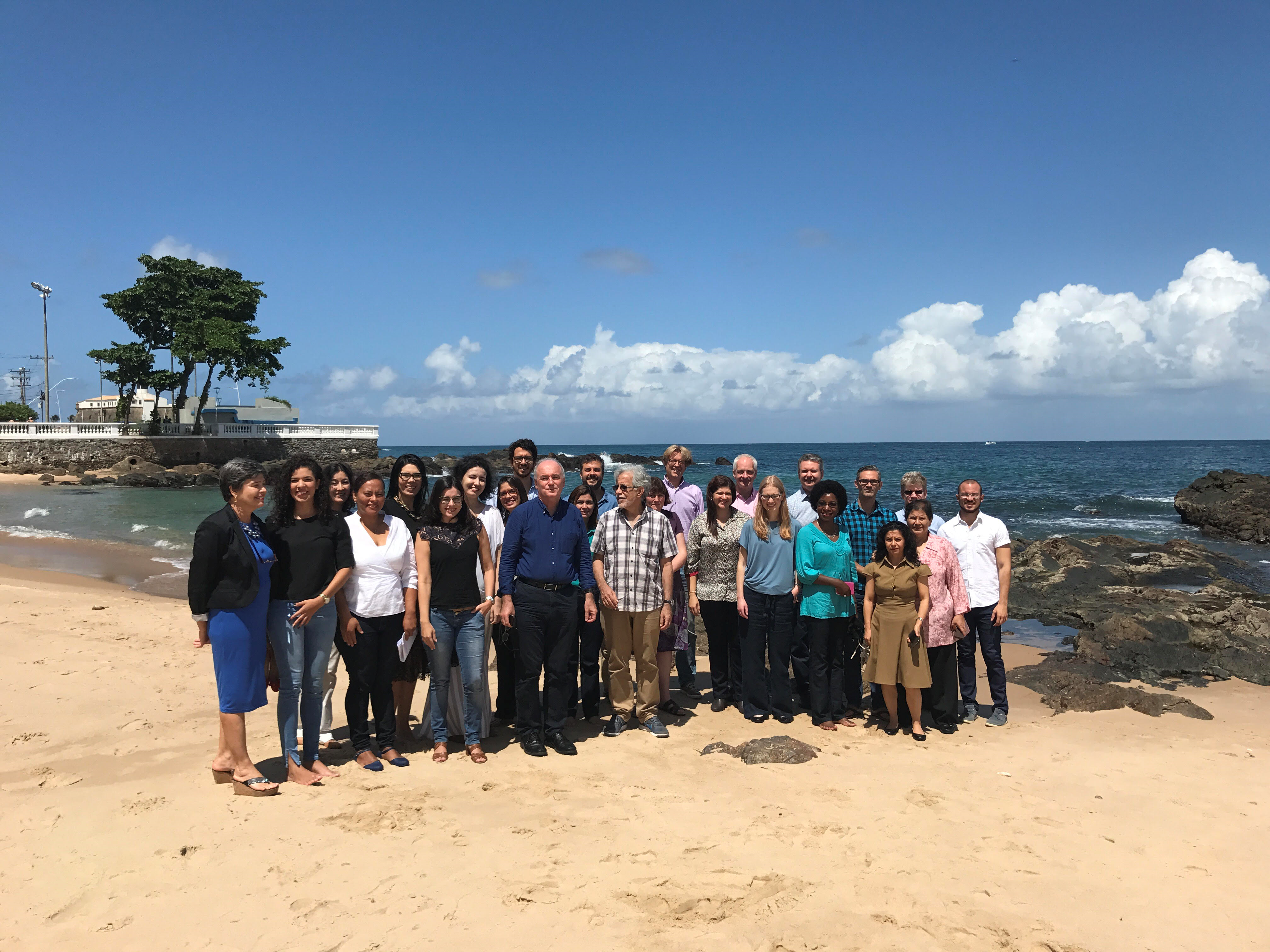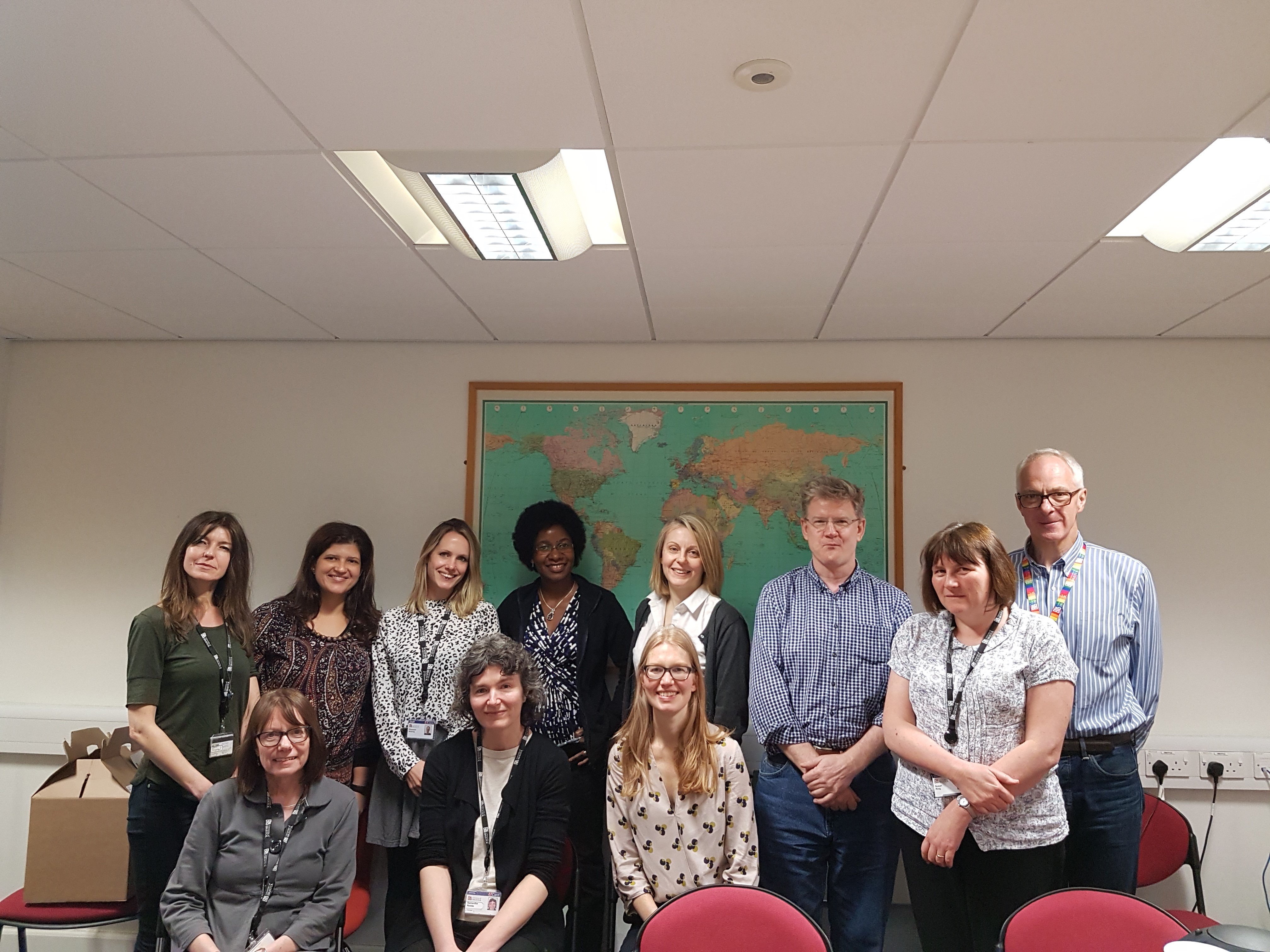The World AsthmaPhenotypes Study (WASP) aims to better understand and characterise different sub-types (phenotypes) of asthma.
The World AsthmaPhenotypes Study (WASP) aims to better understand and characterise different sub-types (phenotypes) of asthma. Involved in the study are five centres; Bristol (UK), Wellington (New Zealand), Salvador (Brazil), Esmeraldas Province (Ecuador), Entebbe (Uganda).
The World AsthmaPhenotypes Study (WASP) aims to better understand and characterise different sub-types (phenotypes) of asthma. This work is needed to better understand the aetiological mechanisms of asthma and to identify new causes and new treatments.
Most research has treated asthma as an “allergic disease”, but we have previously shown that less than one-half of asthma cases involve allergic mechanisms, and that the association between allergy and asthma is much weaker than in low-and-middle income countries than in high income countries. Research is needed into better ways of defining the different types of asthma, and to understand the balance between the types of asthma in areas with different risk factors and different levels of asthma prevalence. This is needed to enable low-and-middle income countries to avoid the asthma epidemic that has occurred in high-income countries. Better characterisation of the different types of asthma is also needed to enable better management and prevention of asthma in both high and low-and-middle income countries.
This study is going beyond previous work both by including low-middle income countries (and high/low prevalence centres), and by collecting much more detailed biological information than has been collected previously. By identifying risk factors that are common to the different types of asthma in these different settings, the study will help to identify what causes asthma and this will inform both prevention and treatment.
The study is being conducted in five centres with a range of asthma prevalence levels and exposures (and a likely range of prevalence of the different types of asthma): (i) Bristol, UK; (ii) Wellington, New Zealand; (iii) Salvador, Brazil; (iv) Esmeraldas Province, Ecuador; and (v) Entebbe, Uganda. Detailed information will be collected from 200 asthmatics and 50 non-asthmatics in each centre, including sputum and nasal samples, blood samples, lung function and skin prick testing. Children and adolescents will be enrolled in all centres except Bristol where participants will be 26-27 years old.
The objectives of this study are to combine detailed biomarker and clinical information to: (i) better understand and characterise AsthmaPhenotypes in high income countries (HICs) and low- and middle-income countries (LMICs), and in high and low prevalence centres; (ii) compare their characteristics, including clinical severity; (iii) assess the risk factors for each phenotype; and (iv) assess how the distributions of phenotypes differs between high prevalence and low prevalence centres.
This research is important because it will lead to a better understanding of the causes of asthma, and raise the potential to prevent the global epidemic of asthma, which has occurred in high-income countries, and is beginning to occur in low-and-middle income countries.
The World AsthmaPhenotypes (WASP) collaboration is based on the AsthmaPhenotypes study which is funded by the European Research Council under the European Union’s Seventh Framework Programme (FP7/2007-2013)/ERC grant agreement no. 668954.
Mauricio Barreto
Salvador, Brazil
John Henderson
Bristol, UK
Phil Cooper
Ecuador and London
Harriet Mpairwe
Entebbe, Uganda
Jeroen Douwes
Wellington, New Zealand
Alvaro Cruz
Bahia, Brazil
Camila Figueiredo
Bahia, Brazil
Sue Ring
Bristol, UK
Cristina Artura
Esmeraldas Province, Ecuador
Alison Elliott
Entebbe, Uganda
Beatrice Nassanga
Entebbe, Uganda
Collin Brooks
Wellington, New Zealand
Rodolfo Saracci
Lyon, France
Mpairwe H, Namutebi M, Nkurunungi G, Tumwesige P, Nambuya I, Mukasa M, Onen C, Nnaluwooza M, Apule B, Katongole T, Oduru G, Kahwa J, Webb EL, Lubyayi L, Pearce N, Elliott AM. Risk factors for asthma among schoolchildren who participated in a case-control study in urban Uganda. eLife 2019; 8: e49496.
Pearce N, Vandenbroucke J. Types of causes. International Journal of Epidemiology 2020; 49: 676-685.
Mpairwe H, Tumwesige P, Namutebi M, Nnaluwooza M, Katongole T, Tumusiime J, Apule B, Onen C, Mukasa M, Kahwa J, Webb EL, Pearce N, Ellison A. Asthma control and management among schoolchildren in urban Uganda: results from a cross-sectional study. Wellcome Open Research 2019; 4: 168.
Vandenbroucke J, Pearce N. Test-negative designs: differences and commonalities with other case-control studies with ‘other patient’ controls. Epidemiology 2019; 30: 838-844.
Richiardi L, Pearce N, Pagano E, Di Cuonzo D, Zugna D, Pizzi C. Baseline selection on a collider: a ubiquitous mechanism occurring in both representative and selected cohort studies. Journal of Epidemiology and Community Health 2019; 73: 475-480.
Pearce N, Vandenbroucke J, Lawlor D. Causal inference in environmental epidemiology: old and new approaches. Epidemiology 2019; 30: 311-316.
Nissen F, Douglas IJ, Mullerova H, Pearce N, Bloom C, Smeeth L, Quint JK. Clinical profile of pre-defined asthma phenotypes in a large cohort of UK primary care patients (CPRD). Journal of Asthma and Allergy 2019; 12: 7-19.
RutterC, Silverwood RJ, Williams HC, Ellwood, Asher I, Garcia-Marcos L, Strachan DP, Pearce N, Langan SM, and the ISAAC Phase Three Study Group. Are environmental factors for atopic eczema in ISAAC Phase Three due to reverse causation? Journal of Investigative Dermatology 2019; 139: 1023-1036.
Silverwood R, Rutter C, Mitchell E, Asher I, Garcia-Marcos L, Strachan D, Pearce N, and the ISAAC Phase Three Study Group. Are environmental risk factors for current wheeze in the International Study of Asthma and Allergies in Childhood (ISAAC) Phase Three due to reverse causation? Clinical and Experimental Allergy 2019; 49: 430-441.
Mulick A, Allen V, Williams HC, Grindlay DJC, Pearce N, Abuabara K, Langan SM. Classifying atopic dermatitis: protocol for a systematic review of subtypes (phenotypes) and associated characteristics. BMJ Open 2018; 8: e023097 [doi:10.1136/bmjopen-2018-023097].
Pembrey L, Barreto ML, Douwes J, Cooper P, Henderson J, Mpairwe H, Ardura-Garcia C, Chico M, Brooks C, Cruz AA, Elliott AM, Figueiredo CA, Langan SM, Nassanga B, Ring S, Rodrigues L, Pearce N. Understanding asthma phenotypes: the World Asthma Phenotypes (WASP) international collaboration. ERJ Open Research 2018; 4: 00013-2018.
Vandenbroucke J, Pearce N. From ideas to studies: how to get ideas and sharpen them into research questions. Journal of Clinical Epidemiology 2018; 10: 253-264.
Pearce N. Bias in matched case-control studies: DAGs are not enough. European Journal of Epidemiology 2018; 33: 1-4.
Asher I, Billo N, Bissell K, Chen-Yuan C, Ellwood P, El Sony A, Garcia-Marcos L, Marks G, Pearce N, Strachan D. The Global Asthma Network. In: The Global Asthma Report 2018. Auckland, New Zealand: Global Asthma Network, pp 12-13.
Asher I, Pearce N, Strachan D, Billo N, Bissell K, Chen-Yuang C, Ellwood P, El Sony A, Garcia-Marcos L, Marks G. What is asthma? In: The Global Asthma Report 2018. Auckland, New Zealand: Global Asthma Network, pp 16-17.
Marks G, Pearce N, Strachan D, Asher I, Elwood P. Global burden of disease due to asthma In: The Global Asthma Report 2018. Auckland, New Zealand: Global Asthma Network, pp 18-21.
Strachan D, Limb E, Pearce N, Marks G, Morales E, Perez-Fernandez V. Asthma mortality. In: The Global Asthma Report 2018. Auckland, New Zealand: Global Asthma Network, pp 27-31.
Garcia-Marcos L, Pearce N, Strachan D, Silverwood R, Rutter C, Elwood E. Factors affecting asthma. In: The Global Asthma Report 2018. Auckland, New Zealand: Global Asthma Network, pp 35-37.
Pearce N, Mallol J, El Sony A, Marks G. Asthma as an NCD priority. In: The Global Asthma Report 2018. Auckland, New Zealand: Global Asthma Network, pp 74-76.
Richiardi L, Barone-Adesi F, Pearce N. Cancer subtypes in aetiological research. European Journal of Epidemiology 2017; 32: 353-361.
Greenland S, Daniel R, Pearce N. Outcome modeling strategies in epidemiology: traditional methods and basic alternatives. International Journal of Epidemiology 2016; 45: 565-575.
For scientific queries please contact Lucy Pembrey, London, UK
For administration queries, please contact Sarah Thorne, London, UK




